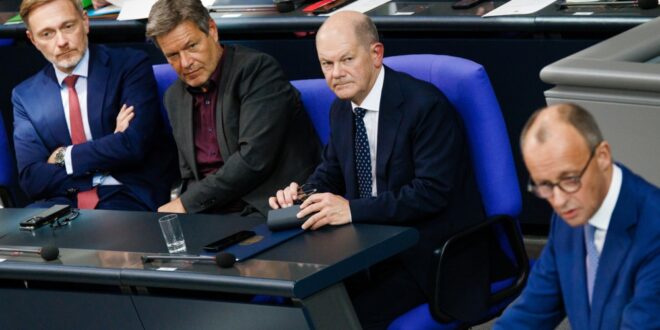Germany’s opposition has criticised the fact Poland was not been included in talks between European leaders and US President Joe Biden on peace in Ukraine, as the question of who should be included in talks on Europe’s post-war order comes to the fore.
Biden joined German Chancellor Olaf Scholz, UK Prime Minister Keir Starmer, and French President Emmanuel Macron for quadrilateral talks in Berlin on Friday. According to the German government, Ukraine’s ‘victory plan’ to force Russia to end its war of aggression was among the topics discussed.
However, Germany’s opposition said they did not include Poland, one of Ukraine’s closest allies and the EU’s biggest military spender, as a percentage of GDP.
“Has anyone thought of inviting Polish Prime Minister Donald Tusk? He has not been asked,” Germany’s centre-right opposition leader Friedrich Merz (CDU/EPP) said in a statement on Saturday.
Merz, the frontrunner in Germany’s 2025 national elections, said the talks resembled “the old West” having a “nice coffee party” rather than acknowledging the new geopolitical realities.
Norbert Röttgen, a leading CDU MP, called Tusk’s absence a “grave mistake.”
“We have a war in Eastern Europe, and only Western European [leaders] are meeting in Berlin,” he told public broadcaster ARD on Friday.
Merz’s Christian Democrats (CDU/CSU) and Tusk’s Civic Platform (PO) are both members of the centre-right European People’s Party (EPP).
The week before, a senior German government official told journalists in Berlin that “practical reasons” played a role in Tusk’s decision not to attend the meeting.
“I don’t see a missed opportunity because we are in regular dialogue with the Tusk government on a wide range of issues,” they added.
Who gets a seat at the table?
The CDU’s criticism came as the question of who should be involved in coordinating a post-war order gains momentum. Italian Prime Minister Giorgia Meloni’s absence from Friday’s meeting was also questioned in her home country.
Merz had previously called for Germany to form a new Ukraine ‘contact group’ on the issue, including France, Britain, and Poland.
“The [German coalition] has to act now,” Merz’s spokesperson told Euractiv.
However, the German government official said that there have not yet been any talks “in such concrete terms” on what would become the primary forum, adding that the ‘Quad’ meeting was not “the nucleus of something new.”
“There are various forums. The one that could take on such a task has not yet manifested,” the official said.
 Eurasia Press & News
Eurasia Press & News




